With the rise of AI, face recognition search engines have gotten even better. They open the door to a simple process involving you uploading the image of an unknown person and getting whatever details you can find about that person online.
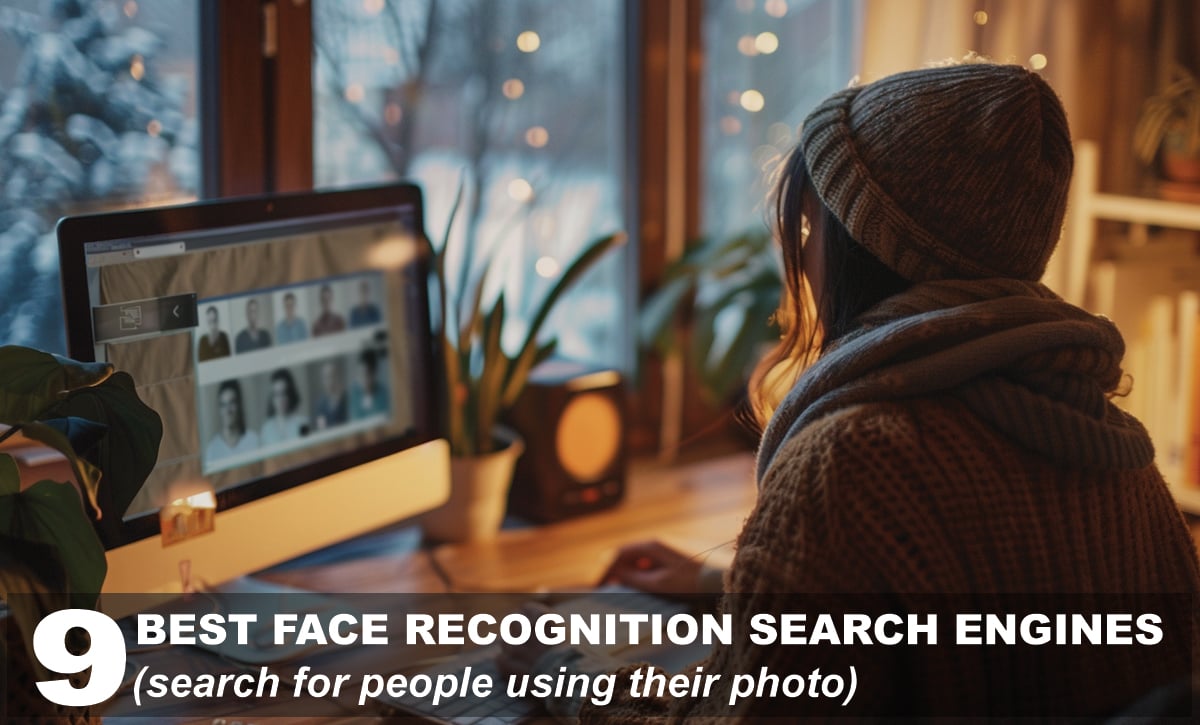
Is it useful? Yes. Is it ethical? Okay, there are indeed plenty of concerns in this area. Let’s talk about it.
Face Recognition Search Engines will be Integral to Future of Internet Surfing
Face recognition search engines are poised to become an integral part of the future of internet surfing. As the online world continues to expand, the need for more intuitive and efficient search methods becomes more and more important.
In a world filled with massive amounts of textual data, the ability to search for information using facial images is a logical extension of the user experience. You can now simply upload a picture of a person via the search bar, and search engines can identify and provide relevant information about them.
The info that can be retrieved may include their name, occupation, affiliations, and even links to their social media profiles. Now all this data can indeed be acquired without such engines as well, but their existence makes the process of using text-based search outdated.
How Do Face Recognition Search Engines Work?
Face recognition search engines work by leveraging advanced computer vision and machine learning algorithms to identify and match faces in images or videos with existing data in their databases.
The first step is, of course, face detection by means of scanning an image to locate and isolate human faces. Once that’s done, the engine extracts specific facial features, like the positioning of the eyes, nose, mouth, and other key facial characteristics.
All this data is then used to create a face template, which is compared to a cache of pre-existing face templates. This database may contain millions of entries, representing known individuals or publicly available images.
Sophisticated matching algorithms are then used to calculate a similarity score or distance metric between the input face and the database faces. If the similarity score exceeds a certain predefined threshold, it’s considered a match, and the corresponding identity or information associated with that face is retrieved.
An output of the possible match is then provided to the user.
9 Best Face Recognition Search Engines
FaceCheck.ID
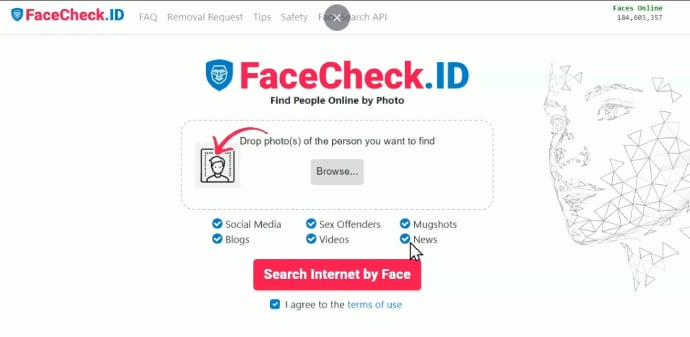
FaceCheck has positioned itself as an investigative search engine aimed at allowing you to search the Internet using a photo of a face. Its rich search results are replete with links to web pages featuring details of the person you’re looking for.
The website features a match quality score that ranges from 0 to 100 to tell you how closely the face matches. And FaceCheck.id makes sure to only index publicly available photos. Moreover, this portal even honors genuine requests for the removal of copyrighted material.
Social Catfish
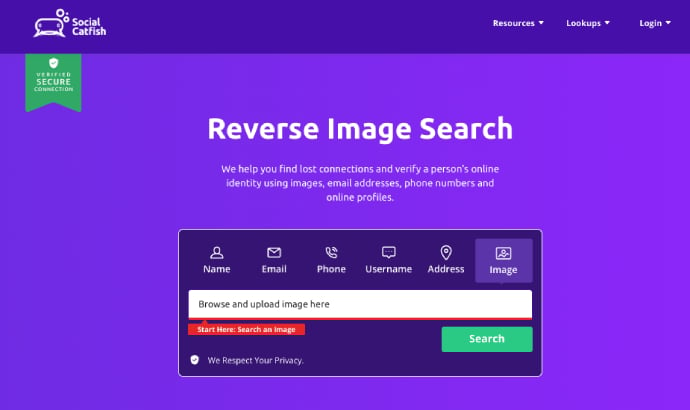
Although Social Catfish is primarily a reverse image search website, it also offers you the ability to search for people using their other credentials like email, phone number, social media profiles, and more.
It could come in handy for those who wish to verify whether online acquaintances are scammers or genuine parties.
This service makes use of image metadata and proprietary technology to scan millions of social profiles in seconds and provide detailed results. The only catch is that you need to pay around $6 to see the results once or opt for a subscription to keep using it.
PimEyes
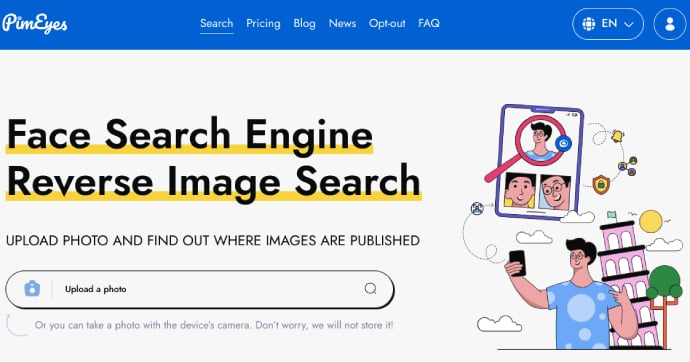
PimEyes is known for its quick and accurate face recognition. Its motive is simple – letting you upload an image, and scouring the Internet to tell you exactly where it was uploaded. Moreover, it even gives you granular control over the search parameters.
For instance, you chose the search time to be anything from the last 24 hours to the past year. There’s even a Deep Search option but it’s part of the paid version. This brings us to the fact that a paid subscription is also needed to visit the links that PimEyes comes up with.
TinEye
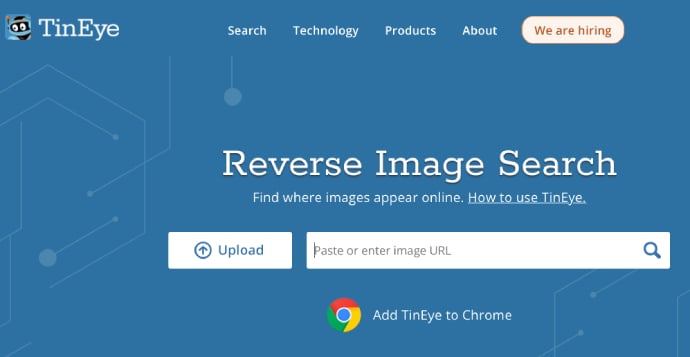
TinEye’s advanced reverse image search products help make your images searchable. The company’s unique MatchEngine delivers proprietary image verification, content moderation, and fraud detection, while the TinyEye Alerts feature lets you continuously track where your company’s proprietary images are appearing online.
It can even be used in the form of a browser extension on various popular browsers. Started in 2008, TinEye is actually a suite of products aimed at enterprise audiences. But you can certainly make use of its reverse search engine easily.
Yandex

Yandex is basically Russia’s very own Google. But unlike Google, it allows facial recognition in its reverse image search. If you upload a photograph to Yandex, it will proffer you many pieces of information based on that person’s facial recognition and what clothing they are wearing.
And it’s all free of cost. So you can easily visit the links presented by Yandex. And there’s so much more that this search engine is capable of, including translation, navigation, and allowing you to play a wide variety of games.
PicTriev
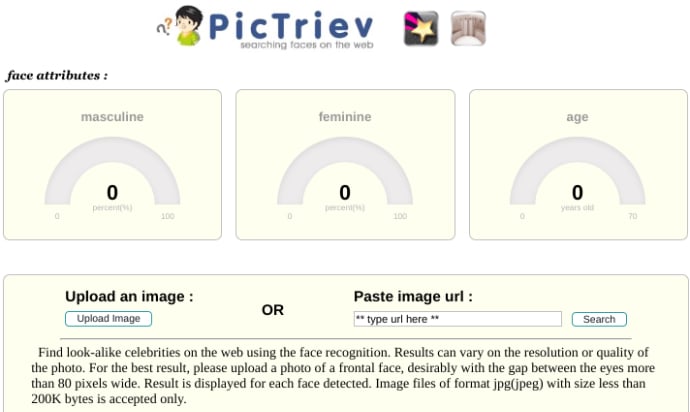
PicTriev is more fun than seriousness. It’s a portal where you can upload your image and have it return the results of celebrities who look like you. It even has two other results for you in the form of masculine, feminine, and age parameters.
It’s not something we’d call accurate or even genuine, but it’s certainly a lot of fun to use when your friends are around. And it’s completely free as well.
Bing
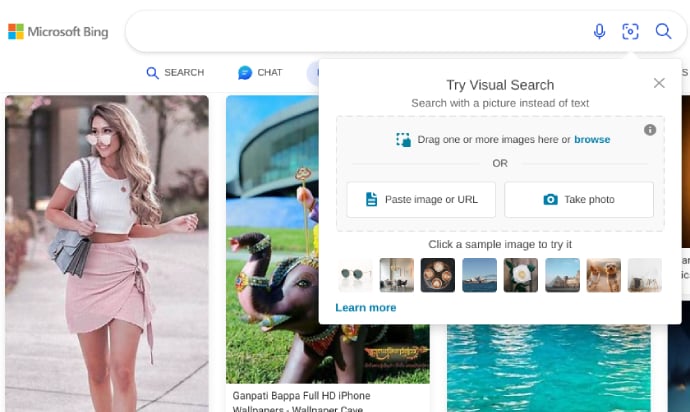
Bing also has its own reverse image search feature. You can enter the Bing Image Search section to upload the photo of the person you wish to have more information about and the search engine will do the job for you, presenting a wide variety of results.
And moreover, it’s completely free to use. Besides, Bing is a full-bodied Google alternative as well.
In fact, several folks prefer it over Google because of the distinct nature of some of the results it offers (not to mention how broken Google search has become since its “Helpful” Content Update in September 2023).
Image Raider
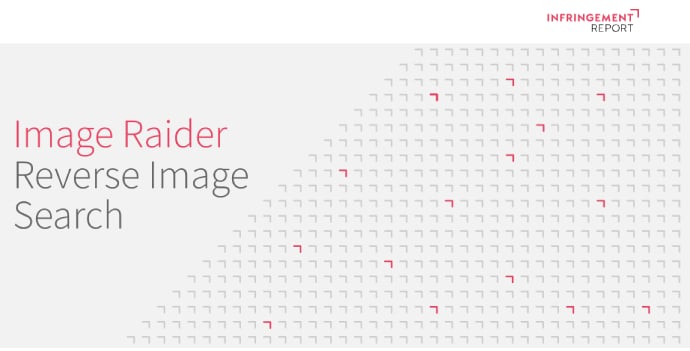
Image Raider is the simplest reverse image search tool for completing individual searches. But there’s more to it than just that. The website also offers dedicated monitoring services that are targeted towards law firms, photographers, and developers.
These services excel at finding infringements and providing proprietary data to prioritize infringements by the ones that are likely to be most valuable. They can, moreover, be completely customized to sync with your cloud services and even integrate with your CRM.
Berify
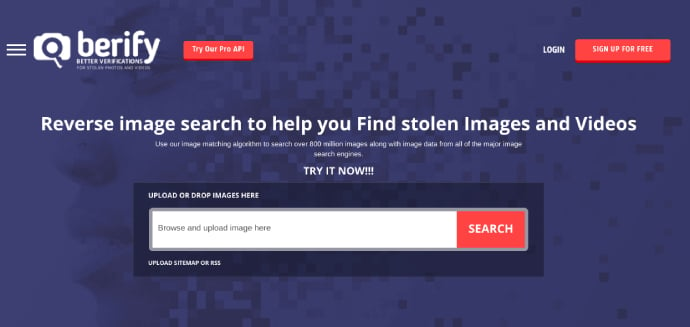
Berify is known for using custom algorithms and searching techniques in order to offer its proprietary solution. It uses results from sites like Google, Yandex, and Bing to maximize the chances of image discovery.
One of its best features is its ability to notify you when there’s a misuse of your identity in images online. However, all this comes at a price and even the basic features of the website cannot be used before a commitment to one of its plans.
Frequently Asked Questions
What Are The Uses Of Face Recognition Search?
- Being able to locate lost connections by using old photographs.
- Saving yourselves from scams by ensuring that the person you’re interacting with is real, and not some purely AI generated headshot.
- Tracking the online profiles of a person to find out whether they are active on dating sites, social media, and public forums.
- Finding whether copyrighted photos by photographers are being used for commercial purposes without proper consent.
- Finding duplicate content or tracking marketing efforts.
Can You Reverse Search A Face On Google?
Yes, you can reverse search a face on Google Images.
Can I Search A Person By Face?
Yes, the services we’ve mentioned in the space above allow you to search for individuals by merely uploading a photo of theirs or pasting the image URL in the search bar.
Is There A Free Facial Recognition Site?
There are indeed free facial recognition sites available out there, Bing being one of them. Most of the others provide you with results that are locked and can only be unlocked after committing to a payment.
Disclaimer: This article is for informational purposes only. We cannot verify or guarantee the legality of accessing the websites and services appearing in this article.











